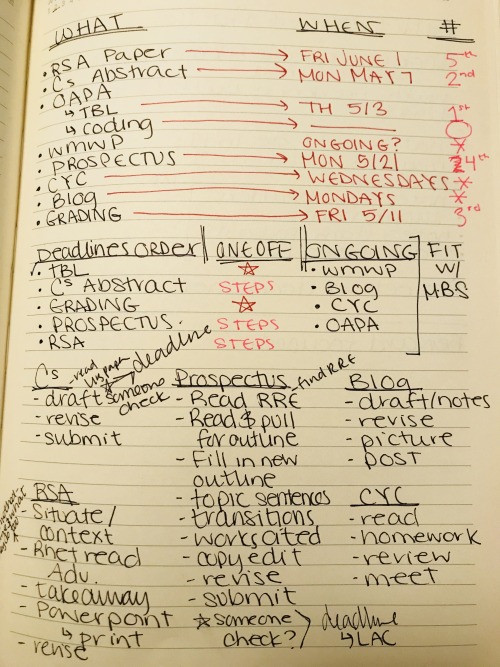Academics usually welcome the end of the school year: we tie bows on old projects and send them off marked “done” (or “grades submitted”), and we finally get to set personal goals for summer.
However, as the Spring semester came to a close, old fears started to bubble up in my mind. How will I hold myself accountable without deadlines? How will I bounce between work and research projects and accomplish them all? Will I spend too much or too little time on self care? How will I know if I’m doing anything right?!
These fearful questions are not new. I go through them at the beginning of each summer and they usually lead me to two feelings:
Overwhelm: There are too many things to do! I have no idea where to begin!
Procrastination: I’m too overwhelmed! It won’t hurt to put this project off…
In my research for this week, I found the most miraculous quote on Gabby Bernstein’s Instagram: “I used to look for answers to problems. Now I look for solutions…” It would be easy for me to say “Well, I’m an Obliger, so I’ll never be able to set and meet deadlines without external accountability. Guess I’m screwed for the summer!” That would be looking for an answer to my overwhelm/procrastination problem. Instead, I’m committing my May theme to finding a solution: make goal setting work for me.
My first step? Planning.
Making Planning Personal
Rewards
My first step was to research productivity and planning. I looked to Charles Duhigg, an expert on habit and author of The Power of Habit and Better, Faster, Stronger. Duhigg says that all habits are a series cues, routines, and rewards. I trust that sticking to a plan will yield multiple rewards: I will achieve my goals, I will feel free to relax, and I will feel proud of myself. He suggests that we write our stretch goal at the top of our to do lists each day to motivate ourselves to work productively. I wrote “Prospectus” on the top of my to do list every day last week–even though I knew I likely would not actually get to my prospectus that day–because I wanted the reminder that finishing immediate tasks now would get me closer to finishing my prospectus…which would get me closer to my key rewards: goal achieved, relaxation, pride.
Plan for Bumps in the Road
I preemptively considered solutions to problems I might run into:
- Procrastination? I will set up deadlines to send drafts to a friend who will give me feedback.
- What if I get assignments out of the blue? I will leave blank space in my day so I can shift things if needed.
- What if I feel tired or grumpy or stressed? I will make my daily tasks manageable and reward myself for meeting small goals.
- What about negative self talk/setting unrealistic expectations? I will be honest with myself about how long a project or task will take.
- What if I run out of steam? I will use Pomodoro, 90-Minute Sessions, and will stop and switch to another project if I need to.
Make in Manageable
When I knew I wanted to learn how to plan better I asked my friend Liz, the most efficient graduate student scholar I know. When Liz sets a goal, she achieves it. Liz is an Upholder, but more than that she knows how to plan in a way that works for her. She told me to list all of the major tasks I wanted to complete, list their deadlines, and then break them down into parts. I can then assign each part to deadlines across the months of summer. This might sound simple, but I had previously avoided this task out of a fear of overwhelm. You can see why if you look at the example of my breakdown:

Note that I have multiple ongoing projects. But, once I broke them down into parts, I was able to start imagining how I can structure a summer research and writing schedule around my office manager and consulting work and healing appointment/practices. I will share updates on my progress on actually achieving these parts throughout May.

Even if you are a rockstar planner already, I encourage you to think about how you could personalize planning to make it more rewarding and comfortable when you do go through a transition like semester to summer.
Jot down answers to the following questions—and then use your answers as inspiration to break down your own projects into parts.
- What problems do you run into with planning?
- How do you currently fix these problems?
- Why do you think they reoccur?
- Is there a way you can shift your thinking to consider a solution rather than a repeated answer to these problems?
- What are your rewards for meeting small and large goals?
*Please note that the original version of this blog post was published here.
This blog is not affiliated with, associated with, or endorsed by the Pomodoro Technique® or Francesco Cirillo.
Newsletter
Sign up below to access my free newsletter, Tending with Dr. Kate Henry.

